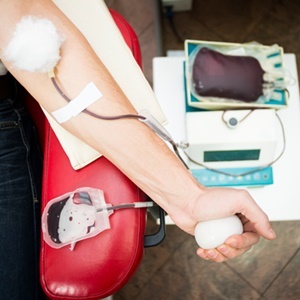
A recent study by Johns Hopkins researchers found that female adolescent blood donors are more likely to have lower iron levels, which could lead to iron deficiency anaemia.
According to the research, numerous studies have shown that younger age, female gender and increased frequency of blood donation are all associated with lower serum ferritin levels (an indication of total body iron levels) in blood donor populations.
While iron deficiency anaemia can be treated, it can have a negative outcome on the developing brains of young females, the study authors say.
“Although blood donation is a largely safe procedure, adolescents are at a higher risk for acute, adverse donation-relation problems, such as injuries from fainting during donations,” according to study leaders Eshan Patel and Aaron Tobian.
The reason for this increased risk is the fact that adolescents have typically lower blood volumes but still donate a standard amount of blood, which can remove about 200 to 250mg of iron from the donor.
That, coupled with menstruation, puts teenage females at higher risk.
According to a report in the Siasat Daily, the researchers analysed data from the National Health and Nutrition Examination Survey, which is a study designed to assess the health and nutritional status of adults and children in the US. The study collected blood samples and questions from the study samples over a period of twelve months.
More specific screening necessary
According to the study authors, the purpose of the research was to highlight the vulnerability of these adolescent donors in terms of the problems that iron deficiency could cause in their development.
The authors noted that current haemoglobin screenings, minimum weight and the minimum interval between repeated blood donations are too altruistic and more should be done to prevent iron deficiency. They suggested oral iron supplementation and a longer interval between repeat donations.
Guidelines in South Africa
While the study made use of US data, South African guidelines can also be considered broad.
Blood banks often visit schools, where adolescents are encouraged to donate blood. According to the South African National Blood Service (SANBS), the requirements for donation are a minimum age of 16, a minimum weight of 50kg and haemoglobin levels of 12.5 g/dL or above.
They make use of screening to ensure that donors' haemoglobin levels are within a safe range and are able to refuse a donation due to medical risk at their discretion. If someone is deferred, it will be in that individual's best interests.
Blood donation is important and people shouldn’t be put off by the above study. It is, however, vital to ensure that donors' iron levels are sufficient and you should ask for more information if:
- You underwent surgery in the past six months or are due for surgery in the following six weeks, as you will need sufficient iron levels to avoid post-surgery anaemia.
- You are pregnant or breastfeeding.
- You’ve suffered from iron deficiency anaemia in the past, but your iron levels are back to normal.
If you are an adolescent blood donor
Blood donation is important and blood banks regularly experience shortages. However, if you are an adolescent who donates blood, you should monitor your overall health carefully to ensure that your iron levels stay normal, even though your haemoglobin levels will be screened.
Be careful if you:
- Have a heavy menstrual flow
- Show signs of iron deficiency such as fatigue and headaches
- Have suffered from anaemia in the past
Image credit: iStock




 Publications
Publications
 Partners
Partners











